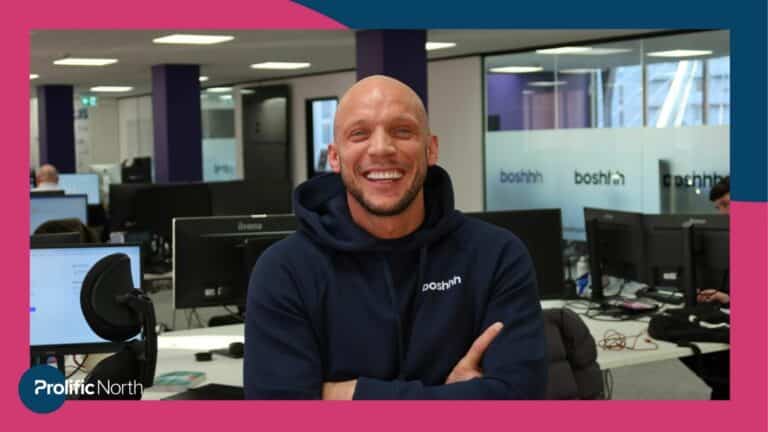High-growth tech companies in the North might be making strides, but is it enough? Despite access to talent and the benefits of lower operating costs when compared with the South, one tech leader believes the North is still “overlooked” especially when it comes to securing “big investment”.
As part of Prolific North’s newly launched GRAFT series, we are going beyond the data to address the challenges and opportunities across Northern tech. So what’s the reality of scaling a high-growth business in the North?
For Lewis Camilleri, CEO and founder of Boshhh Group, scaling his fintech business in the North has been a “double-edged sword”.
“On the plus side, you’ve got access to top talent and the cost of running a company is way more manageable than down South. But the reality is, when it comes to attracting big investment, the North still gets overlooked. There’s a clear funding gap, which means we have to be smarter and scrappier to scale.”
Over the past six months, Boshhh Group has ‘tripled’ its headcount which has been a “huge win” but it hasn’t come without its challenges.
“To upscale successfully, you’ve got to be laser-focused on building the right infrastructure. That means putting proper systems in place, developing your leadership team, and making sure your culture scales with you. It’s easy for growing businesses to lose their identity when expanding, but keeping your core values front and centre is key.”
TechUK recently revealed its Scale-Up Action Plan ahead of the Government’s Industrial Strategy. While scaling is achievable, techUK says challenges persist due to limited access to growth capital, talent shortages, and procurement obstacles continuing to hinder business growth, with some scale-ups forced to look elsewhere to meet their potential.
To tackle this, teckUK says the UK government should use its ‘full growth offer’ to simplify operations and reduce costs for tech businesses to invest and scale-up in the UK.
Adamant that the tech scene in the North is “booming”, Camilleri hopes Bosshhh Group will play a major role in that future growth.
“There’s a real sense of innovation here, with more start-ups and scale-ups making their mark. The region’s thriving digital and tech hubs like Manchester, Leeds, and Newcastle, are creating incredible opportunities.”
But despite those opportunities, there are plenty of barriers that need lifting first.
“Northern tech companies often have to work twice as hard”
“Northern tech companies often have to work twice as hard to attract the same level of funding and attention that their Southern counterparts get. But that’s starting to shift, with more investors waking up to the potential here.”
READ MORE: How Northern tech is ‘grafting’ its way to the top with global ambitions
For Varun Monteiro, angel investor and CEO of Manchester tech firm Finity, Manchester is becoming the “London of the North”.
“London will still always be the main market where investment is sought after but that landscape in the North is changing very quickly,” he explains.
“I’m between London and Manchester and I don’t think scaling is an issue anymore because the majority of people are remote. From fundraising, bootstrapping to getting to client meetings, everything’s done remotely most of the time. Location is no longer a barrier to scaling.”
Scaling companies grew by a 1.39% between 2023 and 2024 with the support of growth hubs, according to Barclays Eagle Labs latest Innovation Nation Report.
Over in Manchester, there are currently 452 high-growth tech companies; Newcastle is second with 175; Sheffield has 171; and Liverpool is home to 159.
While the figures paint a positive picture, there are scaling challenges that Northern investors recognise too.
“There aren’t as many scale-ups as there were probably two or three years ago. That’s probably just relative to the economic climate, contracts are taking much longer to win, even for software businesses,” explains Dr Elizabeth Young, investment manager at VC investor Par Equity.

“Even for SaaS businesses, there is a lot of talk around discounting, longer trials and rethinking business models because a lot of the large corporates and customers have rolled back their buying capacity. And you see that across all industries – even in advanced manufacturing.”
Buying power has “definitely decreased” which she says is reflected in the “growth of companies” as while there are plenty of businesses raising a pre series A investment round up to £3m, the metrics have “moved on” from needing just £1m ARR (annual recurring revenue) to £2m ARR, especially for hardware businesses.
“Some founders now know that, and a lot of founders probably still don’t. Sometimes the VC market, in terms of metrics, has moved. But nobody really tells anybody that it’s moved.
“Anecdotally, there are quite a lot of funds investing in scale-ups but we all speak to each other, and people are asking where have all the series A deals gone? They very much are seeing that in the market.”
READ MORE: Manchester fintech raises £5.7m Series A round to take on global payment providers
There are some funds that are “mega competitive” which people often don’t see as the VC or founders have already established that relationship – and it has been nurtured for “a year or two”.
“In that regard, growth is slow, but hopeful. In the next year or two, things will kind of start to ease up. There’ll be more growth and funding rounds, because the money is there, instead of available at the earlier stages. I think there’s fewer deals again, but it’s still quite strong in terms of deal flow, generally.”
Shain Khoja is an entrepreneur currently building Thriving AI, a healthtech start-up with plans to move to Manchester by the end of 2025. Although she recognises there is government funding to help early-stage businesses through the EIS and SEIS schemes, later stage start-ups are “competing for the same funds”.
“It’s becoming more challenging to actually gain access to funds,” she says.
Over at DSW Ventures, investment manager Emma Cassidy believes talent feeding back into the tech ecosystem is the key to the future success of scaling businesses in the North.
“You need those highly scalable unicorns in the region to almost develop that local talent. There are plenty of unicorns in the Golden Triangle and once those people have exited, they become the angel investors in the local start-ups, or perhaps take on non-exec or advisory roles to help give that advice to scale those businesses.
“Perhaps we need more exited founders in the region to provide that advice.”
To keep Northern businesses in the region to grow, scale and thrive, issues such as transport links “could be more reliable to incentivise people to come and live here.”
“Transport links are not great at all, they are not the cheapest or the most reliable. All of these things would help, rather than it being one big problem to be solved. There are lots of regional funding pots available, and plenty of investors that focus on this region, so it’s about fitting all of the pieces together to make incremental improvements.”
READ MORE: Major founder revealed as keynote speaker for Digital City Festival’s GRAFT event
For Camilleri, he recognises the challenges but remains hopeful as one of the most “effective” ways Boshhh Group has expanded recently is through strategic acquisitions.
“Our recent acquisition of Popit Mobile is a prime example. It’s allowed us to tap into a whole new customer base, boost our market presence, and enhance our service offering. Acquiring the right companies doesn’t just expand your footprint, it brings in fresh expertise, new technology, and more clout in the market.”
Partnerships have been key to the firm’s scaling journey too. “We’ve scaled by doubling down on partnerships. By collaborating with complementary businesses, we’ve been able to offer more comprehensive solutions and create new revenue streams.
“Forming strategic alliances has helped us open doors to new markets, gain credibility faster, and deliver more value to our customers without having to build everything from scratch.”
But to truly scale a business in the North, he believes it’s all about entrepreneurial spirit and determination.
“Scaling a business in the North takes grit,” he explains. “You’ve got to be relentless, innovative, and willing to think outside the box. The potential here is massive, we’ve got the skills, creativity, and drive. Now, it’s about making sure we keep pushing for the recognition and investment that Northern tech businesses deserve.”














